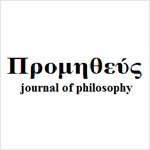The elementary role of the so-called differences in the atomism of Leucippus and Democritus
v. 11, n. 29 • Prometeus: journal of philosophy
Autor: Gustavo Laet Gomes
Resumo:
In the atomism of Leucippus and Democritus, as transmitted by Aristotle, elements are the atoms and everything else are atomic compounds. Still according to Aristotle, all of the physical features of sensible compounds must be traceable down to their elementary chemical constituents. He puts this same kind of demand to the atomic theory and considers that it falls short, because their impassive and immutable atoms cannot suffer the fundamental chemical processes that we witness in nature: generation and alteration. According to Aristotle, there is the atomism of Leucippus and Democritus something we could name as a theory of differences. Chemical processes (as he conceives them) would not be real, but only the expression of the aggregation and segregation of atoms moving through the void. The differences observed in compounds and attested by the senses would be caused by differences between atoms and by their relative positions. In this paper, I explore this theory of differences, showing that it makes sense, but also that it is more complex than Aristotle’s initial suggestion. In atomism, not only the different geometric shapes of the atoms matter, but also the relationships that atoms establish among themselves, as well as the structure of the compound, which presupposes the void, and the atomic motion, summing up a total of seven fundamental differences that respond for most of the functions that Aristotle would like to find in the elements of a chemical theory.
Texto Completo: https://www.ojs.ufs.br/index.php/prometeus/article/view/9101

Prometeus: journal of philosophy
O periódico PROMETEUS FILOSOFIA, vinculado ao Grupos de Pesquisa VIVA VOX e à CÁTEDRA UNESCO ARCHAI, hospedado na Plataforma de Periódicos Científicos da UFS, publica artigos inéditos na área de filosofia e afins, em língua portuguesa, espanhola, inglesa e francesa, bem como resenhas, notas de pesquisa e relatos de experiência que se enquadrem no nosso campo de publicação, isto é, pós-graduandos e pós-graduados em filosofia. O público-alvo é, fundamentalmente, o pós-graduado e o pós-graduando em filosofia.
